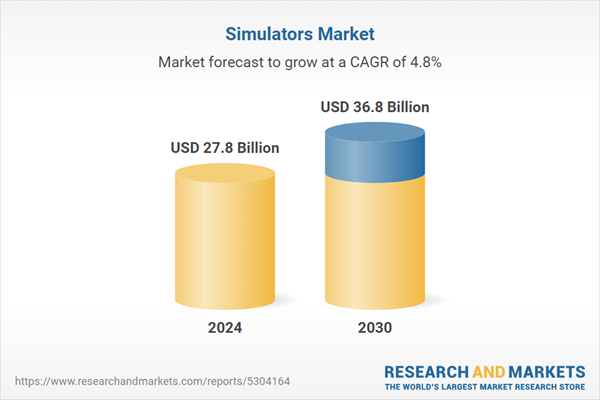Global Simulators Market - Key Trends and Drivers Summarized
How Are Simulators Transforming Training and Education?
Simulators are advanced training tools that replicate real-world environments, allowing users to develop skills, improve decision-making, and enhance safety in controlled settings. They are widely used in industries such as aviation, defense, healthcare, automotive, and energy, offering realistic training experiences without the risks associated with real-life operations. By providing immersive environments through virtual reality (VR), augmented reality (AR), and mixed reality (MR) technologies, simulators have become critical components of training programs, supporting everything from pilot training and surgical practice to driver education and military exercises. As industries embrace digital transformation, simulators are evolving to offer more complex, data-driven, and interactive training experiences.What Are the Key Segments in the Simulators Market?
Major types include full-flight simulators, driving simulators, medical simulators, and process training simulators, with full-flight simulators holding the largest market share due to the stringent requirements for pilot training in the aviation industry. Applications cover pilot training, military training, medical training, driver education, and industrial training, with pilot training representing a significant segment driven by the need for safe and efficient training in civil and military aviation. End-users encompass aviation, defense, healthcare, automotive, and energy sectors, with the aviation sector leading the market due to regulatory mandates and the need for continuous pilot skill development.How Are Simulators Being Integrated Across Various Training Programs?
In the aviation industry, simulators are used for pilot certification, recurrent training, and emergency procedure drills, providing a safe environment to practice complex maneuvers and situations. The defense sector utilizes simulators for combat training, equipment handling, and mission planning, allowing military personnel to prepare for diverse scenarios without real-world risks. Healthcare facilities use medical simulators to train surgeons, nurses, and other medical staff in procedures such as laparoscopic surgery, CPR, and trauma response, improving clinical skills and patient safety. In the automotive industry, driving simulators are employed for driver education, road safety training, and autonomous vehicle development, offering realistic traffic conditions and hazardous scenarios. Additionally, process simulators are used in industries like oil and gas, manufacturing, and power generation to train operators on equipment handling, safety protocols, and process optimization.What Factors Are Driving the Growth in the Simulators Market?
The growth in the Simulators market is driven by several factors, including the increasing emphasis on safety, regulatory compliance, and skill development across industries such as aviation, defense, and healthcare. The need for cost-effective training solutions, which reduce operational risks and resource consumption, has accelerated the adoption of simulators. Advancements in VR, AR, and MR technologies have enhanced the realism and interactivity of simulators, supporting more immersive training experiences. The rise of autonomous systems in sectors like automotive and energy has further fueled demand for simulators, which are critical for developing and testing new technologies. Additionally, government investments in defense and infrastructure training, along with the growing focus on remote and digital learning, have contributed to the expansion of the simulators market.Report Scope
The report analyzes the Simulators market, presented in terms of market value (US$ Thousand). The analysis covers the key segments and geographic regions outlined below.- Segments: Component (Products, Services); Platform (Maritime, Airborne, Land); Application (Military Training, Commercial Training).
- Geographic Regions/Countries:World; United States; Canada; Japan; China; Europe (France; Germany; Italy; United Kingdom; Spain; Russia; and Rest of Europe); Asia-Pacific (Australia; India; South Korea; and Rest of Asia-Pacific); Latin America (Argentina; Brazil; Mexico; and Rest of Latin America); Middle East (Iran; Israel; Saudi Arabia; United Arab Emirates; and Rest of Middle East); and Africa.
Key Insights:
- Market Growth: Understand the significant growth trajectory of the Products Component segment, which is expected to reach US$22.7 Billion by 2030 with a CAGR of a 4.5%. The Services Component segment is also set to grow at 5.2% CAGR over the analysis period.
- Regional Analysis: Gain insights into the U.S. market, valued at $7.3 Billion in 2024, and China, forecasted to grow at an impressive 7.5% CAGR to reach $8.2 Billion by 2030. Discover growth trends in other key regions, including Japan, Canada, Germany, and the Asia-Pacific.
Why You Should Buy This Report:
- Detailed Market Analysis: Access a thorough analysis of the Global Simulators Market, covering all major geographic regions and market segments.
- Competitive Insights: Get an overview of the competitive landscape, including the market presence of major players across different geographies.
- Future Trends and Drivers: Understand the key trends and drivers shaping the future of the Global Simulators Market.
- Actionable Insights: Benefit from actionable insights that can help you identify new revenue opportunities and make strategic business decisions.
Key Questions Answered:
- How is the Global Simulators Market expected to evolve by 2030?
- What are the main drivers and restraints affecting the market?
- Which market segments will grow the most over the forecast period?
- How will market shares for different regions and segments change by 2030?
- Who are the leading players in the market, and what are their prospects?
Report Features:
- Comprehensive Market Data: Independent analysis of annual sales and market forecasts in US$ Million from 2024 to 2030.
- In-Depth Regional Analysis: Detailed insights into key markets, including the U.S., China, Japan, Canada, Europe, Asia-Pacific, Latin America, Middle East, and Africa.
- Company Profiles: Coverage of players such as Airbus S.A.S., ARI Simulation, Avion Group, Boeing, CAE Inc. and more.
- Complimentary Updates: Receive free report updates for one year to keep you informed of the latest market developments.
Some of the 229 companies featured in this Simulators market report include:
- Airbus S.A.S.
- ARI Simulation
- Avion Group
- Boeing
- CAE Inc.
- Collins Aerospace
- ECA Group
- Elite Simulation Solutions
- Flight Safety International
- Frasca International, Inc.
- Indra
- Kongsberg Maritime
- L3Harris Technologies, Inc.
- Precision Flight Controls, Inc.
- Raytheon Company
- Saab AB
- Simcom Aviation Training
- Thales Group
- Tru Simulaion + Training Inc.
- VSTEP Simulation BV
This edition integrates the latest global trade and economic shifts into comprehensive market analysis. Key updates include:
- Tariff and Trade Impact: Insights into global tariff negotiations across 180+ countries, with analysis of supply chain turbulence, sourcing disruptions, and geographic realignment. Special focus on 2025 as a pivotal year for trade tensions, including updated perspectives on the Trump-era tariffs.
- Adjusted Forecasts and Analytics: Revised global and regional market forecasts through 2030, incorporating tariff effects, economic uncertainty, and structural changes in globalization. Includes historical analysis from 2015 to 2023.
- Strategic Market Dynamics: Evaluation of revised market prospects, regional outlooks, and key economic indicators such as population and urbanization trends.
- Innovation & Technology Trends: Latest developments in product and process innovation, emerging technologies, and key industry drivers shaping the competitive landscape.
- Competitive Intelligence: Updated global market share estimates for 2025, competitive positioning of major players (Strong/Active/Niche/Trivial), and refined focus on leading global brands and core players.
- Expert Insight & Commentary: Strategic analysis from economists, trade experts, and domain specialists to contextualize market shifts and identify emerging opportunities.
Table of Contents
Companies Mentioned (Partial List)
A selection of companies mentioned in this report includes, but is not limited to:
- Airbus S.A.S.
- ARI Simulation
- Avion Group
- Boeing
- CAE Inc.
- Collins Aerospace
- ECA Group
- Elite Simulation Solutions
- Flight Safety International
- Frasca International, Inc.
- Indra
- Kongsberg Maritime
- L3Harris Technologies, Inc.
- Precision Flight Controls, Inc.
- Raytheon Company
- Saab AB
- Simcom Aviation Training
- Thales Group
- Tru Simulaion + Training Inc.
- VSTEP Simulation BV
Table Information
| Report Attribute | Details |
|---|---|
| No. of Pages | 556 |
| Published | January 2026 |
| Forecast Period | 2024 - 2030 |
| Estimated Market Value ( USD | $ 27.8 Billion |
| Forecasted Market Value ( USD | $ 36.8 Billion |
| Compound Annual Growth Rate | 4.8% |
| Regions Covered | Global |









